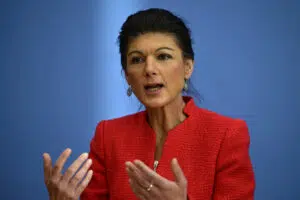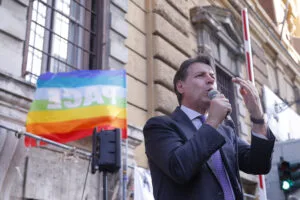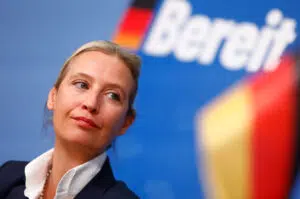Brussels – It’s still all in the realm of political fantasy; however, precisely one week ahead of the vote, there have been increasingly pressing contacts between national parties in member countries to define the new set-up of the newly elected EU Parliament. Not just between political forces that have formed traditional parliamentary groups but also, and especially, between those that have found themselves excluded, suspended, or marginalized or that have long sought European affiliation without succeeding. The ambitious goal is to create new groups in the EU Parliament, breaking the now-established balances of the seven in the legislature that is ending.
What’s happening on the left

The most eagerly awaited and watched movement is on the far left end of the hemicycle, where one of the most well-known faces of Germany’s far left and former leader of Die Linke, Sahra Wagenknecht, is poised to turn the tables. With her new party Alliance Sahra Wagenknecht – Reason and Justice (BSW), which, according to polls, is set to win 7-8 percent of the votes, she is looking at a platoon of 7/8 MEPs who will almost certainly not affiliate with the Left Group (to which Die Linke belongs). There are no other ready-made solutions in Strasbourg, which is why Wagenknecht has long been in touch with other national forces of the red-brown political spectrum, as jargon calls those parties that present left-wing social demands (such as the minimum wage) but with strong conservative and populist leanings (e.g., on immigration or foreign policy).
The first interlocutors are the Slovak populist social democrats of PM Robert Fico, SMER-SSD, who, since October 2023, formed a government with the far-right party of the Slovak National Party. The Smer-Ssd, which also was suspended from the Party of European Socialists (PES) because of its alliance at home with the far right, will most likely find itself without any affiliations in the EU Parliament (unlikely that the Progressive Alliance Group of Socialists and Democrats will welcome it back without a change of course), and the four potential MEPs elected from its ranks – according to polls Fico’s party should win 23 percent – may be interested in creating a new group positioned on the far left but with demands not too different from those of the far-right: reversal of course on environmental policies, stop sending arms to Ukraine, and a crackdown on the migration policy.

No fewer than 23 MEPs from at least a quarter of the member states (seven) are needed to form a political group, so Wagenknecht’s search continues unabated among the dissatisfied far-left. The real big fish, however, is the 5 Star Movement, which, according to polls, should win 16 percent and is in the running to bring 13/14 MEPs back to Brussels after two terms relegated among the non-enrolled. The points of contact with the German red-browns are not few if one considers the government’s experience between 2018 and 2020 (with the League, a member of the far-right group Identity and Democracy): on the one hand, choices that tend to the left such as citizenship income, but on the other hand, support for very restrictive policies on migration and asylum, as well as the more recent strongly opposed positioning on military support for Ukraine. The leader, Giuseppe Conte, has hinted that “we will go to the progressive area, not with the socialists. There will be a surprise.” However, sources within the group were more cautious and explained to Eunews that alliances would be discussed “only after” the elections. However, parliamentary experts who have had close contact with Conte and his deputies give this alliance a done deal.
What’s happening on the right

Also of particular interest, although the scenarios are more elusive and the possible alliances much less defined, is what could happen in the far-right chessboard beyond the two groups of Identity and Democracy (ID) and the European Conservatives and Reformists (ECR, which Fratelli d’Italia is part of). At the moment, anything seems possible, even a convergence of the two parliamentary groups to form a united one, as the most charismatic figure of the French far-right Rassemblement National, Marine Le Pen, proposed. Even more so should this – however difficult – scenario play out, the German far-right of Alternative für Deutschland would most likely find itself isolated, if one bears in mind the latest troubled developments within the group it adhered to in the EU Parliament: under pressure from Rassemblement National, on May 23 the ID Presidency expelled Germany’s AfD group because of the statements of its leading candidate, Maximilian Krah who failed to condemn the Nazi past of the SS special forces.
The support that the AfD still enjoys in Germany–no longer at 22 percent like six months ago, but, according to polls, still around 16 percent — could spur even more Euroskeptic formations than those currently part of ID and the ECR to forge contacts to create a “truly conservative and sovereignist” group, as envisaged by the leader of the Bulgarian pro-Russian and anti-European nationalists Vazrazhdane, Kostadin Kostadinov. The far-right nationalist party, which is pushing for Bulgaria’s withdrawal from NATO and a renegotiation of EU membership, is reportedly ready to form an alliance between potential 3/4 MEPs with the 16/17 German colleagues: “We have already taken steps to create a new group in the EU Parliament and will propose that AfD join us to take the process forward” after the European elections, Kostadinov said, who is also upping the stakes ahead of the parallel early legislative elections in Bulgaria on June 9. Should a green light come from AfD, they will be looking for adherents among the non-members and potential outcasts of an – equally hypothetical – right-wing mega-group in the EU Parliament with Rassemblement National, Fratelli d’Italia, League, Vox, Poland’s Law and Justice and Hungary’s Fidesz.
What the seven groups in the EU Parliament are doing
While all these parties are moving behind the scenes for potential new parliamentary groups during the tenth term of the EU Parliament, the seven that consolidated their position in the now-concluded one are waiting for the results of the polls to figure out how to weigh old and new power relations, to renew, or overturn alliances that are decisive for the majority. At the moment, the most quoted option seems to be a reconfirmation of the pact of pro-European forces that held up the so-called ‘von der Leyen majority’ in this legislature: the European People’s Party (EPP) Group, the Group of the Progressive Alliance of Socialists and Democrats (S&D) and Renew Europe. The Populars have long been considering a potential shift to the right– a very complex move, considering the complex picture of national party affiliations–both for a liberal-popular-conservative agreement as advocated by the president of the EPP, Manfred Weber, and the Italian deputy prime minister, Antonio Tajani, as well as for the explicit opening that came from the current European Commission President and Spitzenkandidatin (joint candidate) of the European People’s Party (EPP), Ursula von der Leyen, in sounding out Meloni for possible cooperation in the next legislature.
Considering that a majority in Europe composed only of Populars and conservatives is not possible according to current polls, one option could be to replicate the Italian government coalition: in Rome, there is a right-wing Forza Italia-Fratelli d’Italia-Lega majority; in Brussels, there could be a very wide right-wing EPP-ECR-ID camp. But almost all of the Populars consider this kind of scenario impractical since the Identity and Democracy Party is full of extremist and anti-European forces (but also that of ECR, which the extreme right nationalist Reconquête has joined and which could expand to the Hungarian premier’s party, Viktor Orbán).
The Greens/Ale Group winks at a broad field of progressive forces and with an EPP that stops looking to the right but, with a likely major downsizing at the ballot box and with the Liberals unwilling to cooperate on many dossiers (such as those on climate and industry), even this scenario in the EU Parliament would be all uphill. The Left Group is watching, with no even remotely solid prospects of participating in a parliamentary majority, and must watch its back against a more credible erosion of membership if the red-brown national parties organize themselves into a new group after the elections.
English version by the Translation Service of Withub








![Enrico Letta [Bruxelles, 3 aprile 2025]](https://www.eunews.it/wp-content/uploads/2025/04/letta-120x86.png)